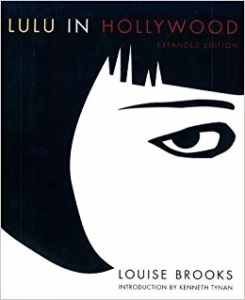At 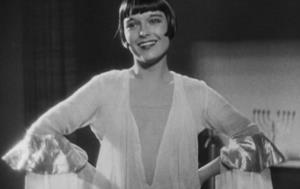 venues around town, you’ll notice a black and white image of a doe-eyed gal with a bob staring back at you. Like with Rachel on Friends, a haircut made a massive impression!
venues around town, you’ll notice a black and white image of a doe-eyed gal with a bob staring back at you. Like with Rachel on Friends, a haircut made a massive impression!
The woman in the image is silent movie star, Louise Brooks, the biggest thing to come from Kansas until Dorothy blew onto the silver screens. Louise specialized in playing flippant flappers in silent movies, tossing her bob at the arrival of sound and laughing leaving stardom until her second act in her senior years.
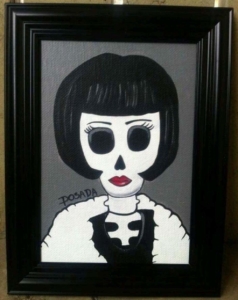 Louise’s upbringing was unconventional. From her mother she inherited a love of culture and art combined with a complete disinterest in child rearing. A love of reading came from her father, who was such a book worm, their home literally went down on one side of the foundation from the weight of his books. Suffice to say Louise spent a lot of time outside playing with her funny friend, Vivian, who found success and comic gold later than Louise by playing Ethel Mertz on I Love Lucy.
Louise’s upbringing was unconventional. From her mother she inherited a love of culture and art combined with a complete disinterest in child rearing. A love of reading came from her father, who was such a book worm, their home literally went down on one side of the foundation from the weight of his books. Suffice to say Louise spent a lot of time outside playing with her funny friend, Vivian, who found success and comic gold later than Louise by playing Ethel Mertz on I Love Lucy.
At fifteen Louise joined a well-respected dance troop crisscrossing the country quickly becoming the female lead then getting fired for not being a people person. Louise’s inability to get along well with others marked her life.
At loose ends she gamboled among the best (and richest) bachelors in Manhattan. One night, watching a new musical, her date, a reviewer, passed out. Picking up his pen and paper Louise took notes and wrote the review for him that was published the next morning under his name. Louise learned two important lessons – she had keen observational skills and was able to work for and with men more powerful than she.
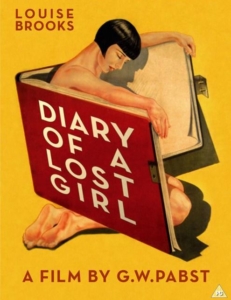 Strong armed into a Paramount contract (Louise wanted to continue dancing, not start acting) she quickly rose to second-tier star, getting the flapper parts Clara Bow turned down. Disinterested, Louise never even bothered to watch any of her performances.
Strong armed into a Paramount contract (Louise wanted to continue dancing, not start acting) she quickly rose to second-tier star, getting the flapper parts Clara Bow turned down. Disinterested, Louise never even bothered to watch any of her performances.
When sound came on the horizon and her contract was up for renewal Louise skipped town impulsively taking the lead in a German film, Pandora’s Box. In Europe, Louise Brooks was treated like royalty and given the perfect working environment, as not a single cast member or crew all spoke the same language. Louise was the only one-language person (English) and reveled in not even having to even try to get along with her co-workers giving a great performance as Lulu. Lulu is an iconic literary character for Germans going from wild party girl, to bride, to destitute prostitute killed on Christmas Eve by Jack the Ripper.
The film didn’t fare well in Europe over the anger of an American playing Lulu (then un-known Marlene Dietrich was passed over for the part). Pandora’s Box did worse in the US as by then no one wanted to watch a silent movie as sound strode across celluloid.
A dejected Louise returned to Hollywood playing bad parts in bad movies, never regaining her former status until she couldn’t even get those parts. Louise returned to her personal Purgatory in Kansas unsuccessfully opening dance studios. (She lacked the people skills to talk mothers into having her train their little girls.)
 Desperate she took her last ten dollars (borrowed from a former NYC beau) and returned to Manhattan to enter her personal Hell. She found work on the radio and at Sak’s but the former movie star always left in a snit.
Desperate she took her last ten dollars (borrowed from a former NYC beau) and returned to Manhattan to enter her personal Hell. She found work on the radio and at Sak’s but the former movie star always left in a snit.
Middle aged and destitute Louise took stock of her life. For better or worse (much of it worse) she hadn’t had a good run and felt the answer may lie in faith. Not one of those “wishy-washy” Protestant sects, but hard-core Catholic. Louise had no interest in the after-life (she didn’t ever think about the future, or even the present all that much). However, despite most of her life being a series of self-inflicted sins she did cotton to the notion of Catholicism offering endless forgiveness. (As someone raised Catholic I found that to be an intellectually unique take on the Church.)
Faith opened two doors and loves for Louise. One was a former lover, Bill Paley, now head of CBS, that provided her a monthly allowance in exchange for her writing. What she wrote about, or published, was up to Louise.
The new lover was the younger curator of the largest collection of silent movies in private hands, the collection in Rochester owned by Eastman Kodak. Louise moved upstate and immersed herself in 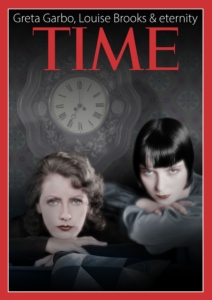 the silents. Watching her own movies for the first time and those of her contemporaries – Joan Crawford, Greta Garbo, Mary Pickford and alike, Louise wrote and wrote.
the silents. Watching her own movies for the first time and those of her contemporaries – Joan Crawford, Greta Garbo, Mary Pickford and alike, Louise wrote and wrote.
Meanwhile, unbeknownst to Louise, European art houses had re-released Pandora’s Box claiming it to be the best of the silents. Tagged “There is no Garbo or Dietrich. There is only Louise Brooks.” The tidal wave of sudden popularity for the movie crossed the pond to the US as Louise released her book named for her Pandora’s Box character, Lulu in Hollywood.
I read the best-selling Lulu in Hollywood as a college senior remembering her bob and the fact she was an excellent writer and observer of early Hollywood. Louise wiped out playing the feckless flapper but she seized her second wave of success touring as a speaker on her book until her death.
Others wrote about the time, like Miriam Cooper and Lillian Gish, but only Louise had such a keen eye. As she described herself, “Like a cat under the seat of kings”.
So the next time you admire her stare on a CD cover or postcard, note that under the bob was troubled yet brilliant mind that entertained millions in silence and with her words and to this day around town.
